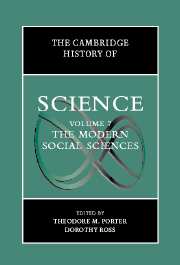Book contents
- Frontmatter
- 1 Introduction: Writing the History of Social Science
- PART I SCIENCES OF THE SOCIAL TO THE LATE NINETEENTH CENTURY
- PART II THE DISCIPLINES IN WESTERN EUROPE AND NORTH AMERICA SINCE ABOUT 1880
- PART III THE INTERNATIONALIZATION OF THE SOCIAL SCIENCES
- 22 The Sciences of Modernity in a Disparate World
- 23 The Social Sciences in Latin America during the Twentieth Century
- 24 Psychology in Russia and Central and Eastern Europe
- 25 Sociology in Egypt and Morocco
- 26 The Social Sciences in Africa
- 27 The Social Sciences in India
- 28 The Social Sciences In China
- 29 The Social Sciences in Japan
- PART IV SOCIAL SCIENCE AS DISCOURSE AND PRACTICE IN PUBLIC AND PRIVATE LIFE
- Index
- References
29 - The Social Sciences in Japan
from PART III - THE INTERNATIONALIZATION OF THE SOCIAL SCIENCES
Published online by Cambridge University Press: 28 March 2008
- Frontmatter
- 1 Introduction: Writing the History of Social Science
- PART I SCIENCES OF THE SOCIAL TO THE LATE NINETEENTH CENTURY
- PART II THE DISCIPLINES IN WESTERN EUROPE AND NORTH AMERICA SINCE ABOUT 1880
- PART III THE INTERNATIONALIZATION OF THE SOCIAL SCIENCES
- 22 The Sciences of Modernity in a Disparate World
- 23 The Social Sciences in Latin America during the Twentieth Century
- 24 Psychology in Russia and Central and Eastern Europe
- 25 Sociology in Egypt and Morocco
- 26 The Social Sciences in Africa
- 27 The Social Sciences in India
- 28 The Social Sciences In China
- 29 The Social Sciences in Japan
- PART IV SOCIAL SCIENCE AS DISCOURSE AND PRACTICE IN PUBLIC AND PRIVATE LIFE
- Index
- References
Summary
This chapter traces the history of Japanese social science in five successive “moments” or intellectual orientations that defined problems, structured analysis, and drove disciplinary development. Importantly, they also helped to set the terms of collective agency in public discourse: What was Japan? — a nation of imperial subjects? of classes? of “modern” individuals? a single Volk? The account is biased toward elite institutions and scholars, largely because social science in Japan, as in many “late developers,” grew out of state concerns and developed as an unequal contest between elite and nonelite scholarship; there was no “free market” of ideas. It is also formalist, in the sense that I see “social science” in terms of the self-consciously professional activity of practitioners themselves.
NEO-TRADITIONALISM AND THE HEGEMONY OF THE PARTICULAR
Japan was the first successful modernizer in Asia. Determined to resist Western domination, elites of the Meiji era (1868–1912) had undertaken a forced march to industrialization and military power through the relentless taxation of peasant production. Initially, this effort was supported by a somewhat free-wheeling Anglophilia. Social Darwinism, the theory of progress, and an ethic of individual and national advancement were the keynotes. Meiji’s state makers understood, however, that Japan could never be a pioneer in industrialization or empire building. They sought cultural self-preservation and national strength while avoiding the pitfalls that beset the pioneer: in short, effective followership.
- Type
- Chapter
- Information
- The Cambridge History of Science , pp. 515 - 534Publisher: Cambridge University PressPrint publication year: 2003

